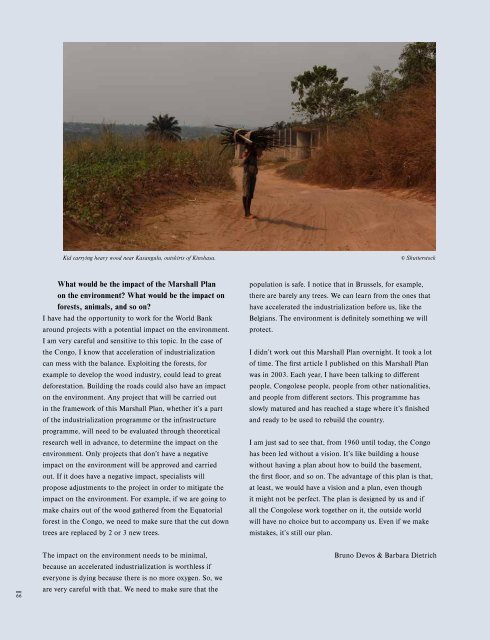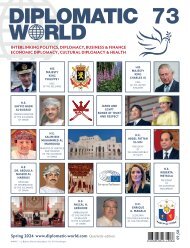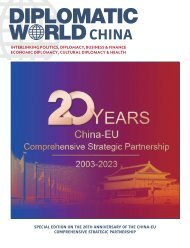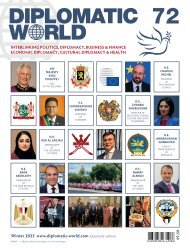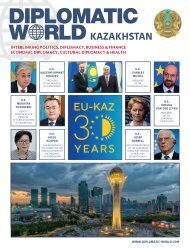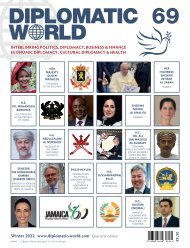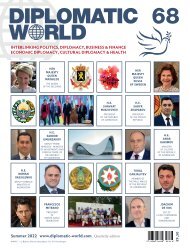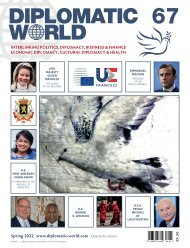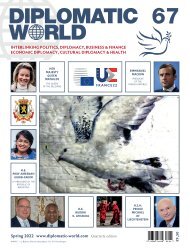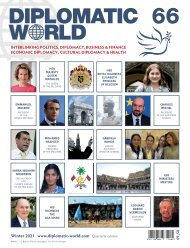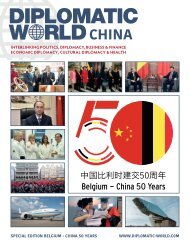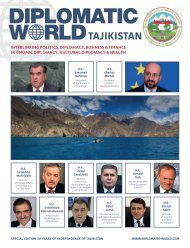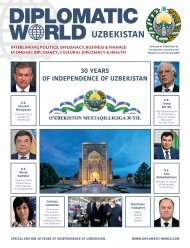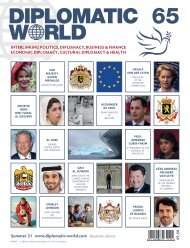Diplomatic World nummer 54
You also want an ePaper? Increase the reach of your titles
YUMPU automatically turns print PDFs into web optimized ePapers that Google loves.
Kid carrying heavy wood near Kasangulu, outskirts of Kinshasa. <br />
© Shutterstock<br />
What would be the impact of the Marshall Plan<br />
on the environment? What would be the impact on<br />
forests, animals, and so on?<br />
I have had the opportunity to work for the <strong>World</strong> Bank<br />
around projects with a potential impact on the environment.<br />
I am very careful and sensitive to this topic. In the case of<br />
the Congo, I know that acceleration of industrialization<br />
can mess with the balance. Exploiting the forests, for<br />
example to develop the wood industry, could lead to great<br />
deforestation. Building the roads could also have an impact<br />
on the environment. Any project that will be carried out<br />
in the framework of this Marshall Plan, whether it’s a part<br />
of the industrialization programme or the infrastructure<br />
programme, will need to be evaluated through theoretical<br />
research well in advance, to determine the impact on the<br />
environment. Only projects that don’t have a negative<br />
impact on the environment will be approved and carried<br />
out. If it does have a negative impact, specialists will<br />
propose adjustments to the project in order to mitigate the<br />
impact on the environment. For example, if we are going to<br />
make chairs out of the wood gathered from the Equatorial<br />
forest in the Congo, we need to make sure that the cut down<br />
trees are replaced by 2 or 3 new trees.<br />
population is safe. I notice that in Brussels, for example,<br />
there are barely any trees. We can learn from the ones that<br />
have accelerated the industrialization before us, like the<br />
Belgians. The environment is definitely something we will<br />
protect.<br />
I didn’t work out this Marshall Plan overnight. It took a lot<br />
of time. The first article I published on this Marshall Plan<br />
was in 2003. Each year, I have been talking to different<br />
people, Congolese people, people from other nationalities,<br />
and people from different sectors. This programme has<br />
slowly matured and has reached a stage where it’s finished<br />
and ready to be used to rebuild the country.<br />
I am just sad to see that, from 1960 until today, the Congo<br />
has been led without a vision. It’s like building a house<br />
without having a plan about how to build the basement,<br />
the first floor, and so on. The advantage of this plan is that,<br />
at least, we would have a vision and a plan, even though<br />
it might not be perfect. The plan is designed by us and if<br />
all the Congolese work together on it, the outside world<br />
will have no choice but to accompany us. Even if we make<br />
mistakes, it’s still our plan.<br />
66<br />
The impact on the environment needs to be minimal,<br />
because an accelerated industrialization is worthless if<br />
everyone is dying because there is no more oxygen. So, we<br />
are very careful with that. We need to make sure that the<br />
<br />
Bruno Devos & Barbara Dietrich


